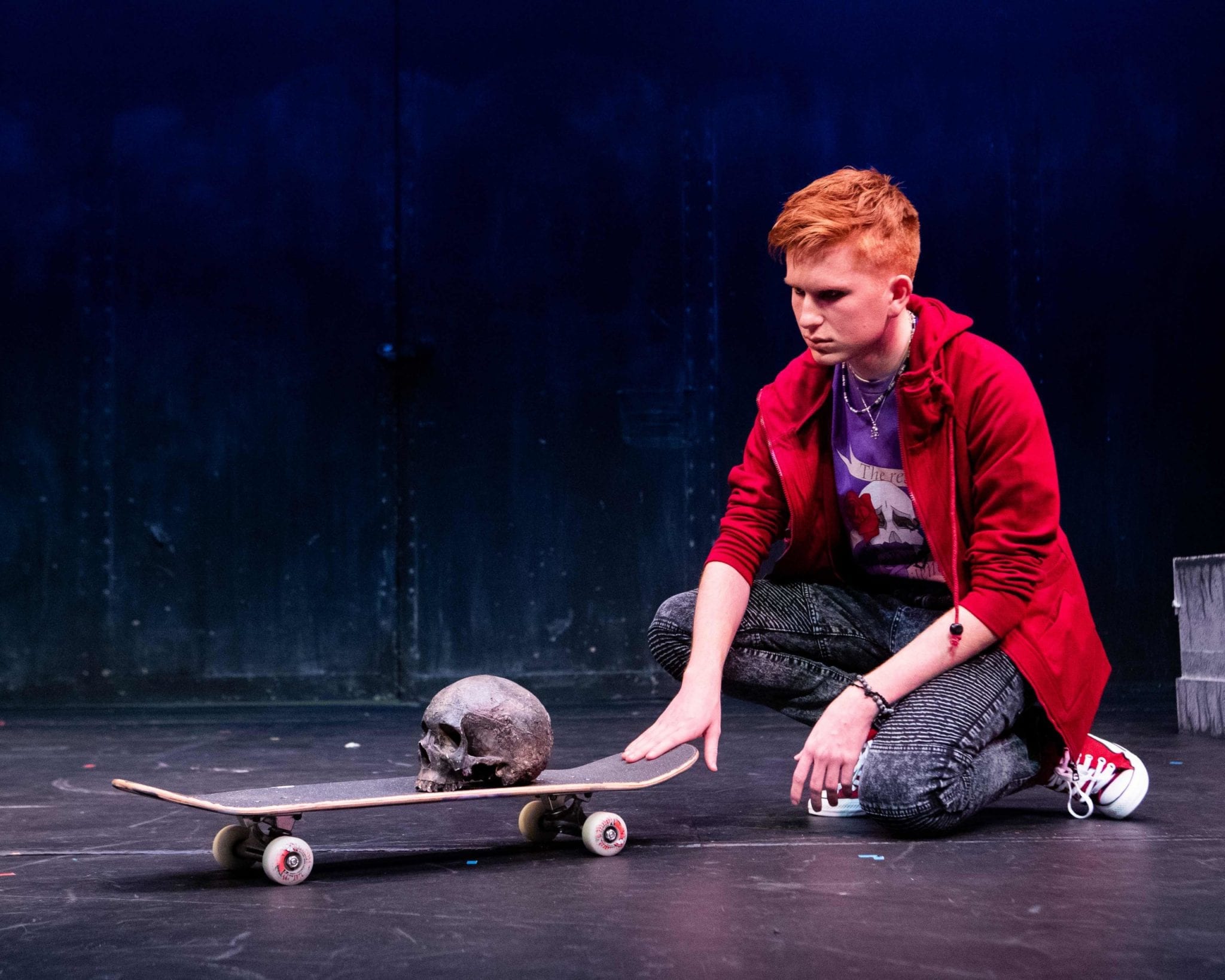PROVO — “What a piece of work is man!” “Alas, poor Yorick! I knew him, Horatio.” And of course, “To be or not to be.” These are the opening lines of some the most famous monologues from Shakespeare‘s work—and the Bard gave them all to the same character. No wonder Hamlet is one of the most coveted roles for actors. BYU Young Company’s touring production of Hamlet has all these lines and other memorable gems. However, their presentation is lacking, though not enough to bother the show’s target demographic of tweens and teens.

Director Teresa Love set this production in contemporary times, with Hamlet and his cohorts portrayed as skater teenagers. The goal of the concept is to make Shakespeare more accessible to the production’s audience, but I fail to identify any scene where the actions or language were more understandable because the characters were dressed in 21st century clothes. But Love’s cast is committed to the setting, as the younger characters enter and exit on skateboards and embrace the brooding, moody teenage angst that is synonymous (to adults) with skater culture.
Where Love’s ideas succeed more is in the audience participation that peppers the show, especially having Rosencrantz, Guildenstern, and some of the players portrayed by audience members. It is an effective technique that gets the children in the audience to pay extra attention when someone their age is on stage.
But what I found disappointing was how the important, profound lines from the script were robbed of their impact through the direction. The “What a piece of work is man!” speech was accompanied by a series of silly gestures. “Alas, poor Yorick!” has a goofy gravedigger (played by Camden Wawro) making distracting sounds upstage and then ends with Yorick’s skull placed on a skateboard and unceremoniously pushed off stage. Antics like this make Hamlet seem trivial and may disappoint adults who expect some meat from their Shakespeare.

But will these decisions bother children? No. Kids do not care about the sublime meditations on death and suicide in the “To be or not to be” speech, nor do they attend Shakespeare to bask in the Bard’s linguistic genius. For adults, though, there is little to chew on in this production—even by the standards of theatre for young audiences.
Love’s cast is capable of meeting the needs of the production. Clark Allen plays Hamlet with a good handle on the diction of the language and the flow of the story. Allen is best in the extreme moments of the play, such as when swordfighting with Laertes or threatening Gertrude. The emotional connections with the other characters, though, seem more difficult for him. There is no spark of romance between Hamlet and Ophelia (played by Samantha Daynes), nor any indication of a meaningful relationship with Horatio (played by Emma Larsen) or Gertrude. Instead, Allen delivers his lines—well and earnestly—while other cast members stand nearby. I attribute this to his inexperience. Allen is a freshman whose credits in the program are all high school productions. Giving a lead performance as competent as his in a 60-minute college Shakespeare production of Hamlet at that age is no small accomplishment.

The senior cast members, especially Tommy Kindall as Claudius, Marion Pack as Gertrude, and Erik Rytting as Laertes, gave more nuanced performances that brought some depth to the production. Rytting’s return as Laertes in Act IV was full of emotional heartbreak that understandably turned to seething anger towards Hamlet—a transformation that was as realistic as it was interesting. Pack is a splash of dignity and grace in the production, and her Gertrude seems like the court peacemaker. Her bewildered reaction to Hamlet’s mood swings would be familiar to any parent of a moody teenager. Finally, Kindall was a strident Claudius, and it was believable that someone so decisive could usurp the throne through murder. Kindall has a knack for making a positive contributing to any ensemble scene, and his reactions during Ophelia’s funeral, the play within the play, or the final fight scene all enriched these pivotal moments. I felt sorry for Kindall, though, who has to wear an ill-fitting suit coat and baggy suit pants (from costume designer Hannah Liberatore).
Although I have misgivings, it is important to remember that BYU Young Company’s Hamlet is not designed to please a critic in his 30s. The real question is whether the show is an engaging show for its target audience of 10- to 15-year-olds. The answer is certainly yes. But there is not much in the production for adults who accompany children to see it. It is hard for me to ignore the gimmick of a teenage skater Hamlet and direction that pulled focus away from the beautiful script. Both flaws seemed to show a lack of trust in Shakespeare’s ability to engage audience members of all ages.
[box]The BYU Young Company production of Hamlet plays Wednesdays through Fridays at 7 PM through February 14, with matinees on February 8 and 14 at 2 PM and 4 PM in the Nelke Theatre in the Harris Fine Arts Center on the campus of Brigham Young University. Tickets are $5-8. For more information, visit byuarts.com.[/box]
